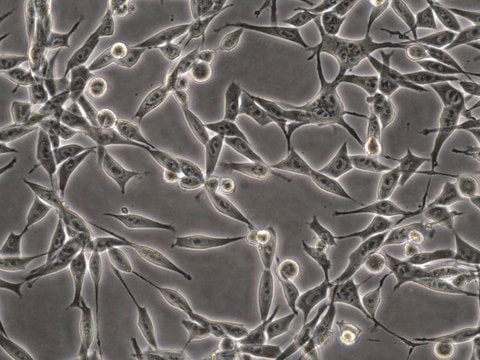SCC142M
DC2.4 Mouse Dendritic Cell Line
Mouse
Synonym(s):
DC 2.4 Cell Line
Sign Into View Organizational & Contract Pricing
Select a Size
All Photos(1)
Select a Size
Change View
About This Item
UNSPSC Code:
41106514
eCl@ss:
32011203
NACRES:
NA.81
Recommended Products
Product Name
DC2.4 Mouse Dendritic Cell Line, DC2.4 dendritic cell line can be used to study dendritic cell biology and immune response.
biological source
mouse
Quality Level
technique(s)
cell culture | mammalian: suitable
General description
.4 are immortalized murine dendritic cells created by transducing bone marrow isolates of C57BL/6 mice with retrovirus vectors expressing murine granulocyte-macrophage CSF (GM-CSF) and the myc and raf oncogenes . DC2.4 exhibits characteristic features of dendritic cells including cell morphology and the expression of dendritic cell-specific markers and the ability to phagocytose and present exogenous antigens on both MHC class I and class II molecules .
Dendritic cells (DC) are the antigen presenting cells of the immune system and are found in most tissues, particularly those that are in contact with the external environment (e.g., skin and the inner linings of the nose, lungs, stomach and intestine). First described in 1973 , one of the primary functions of DCs is to phagocytose foreign pathogens and present the processed antigens to naïve T cells to regulate adaptive immune responses. DCs also express Toll-like receptors and help regulate the innate immune responses. Despite their distribution in most tissues, DC are present at low numbers in vivo and are difficult to maintain in vitro. These difficulties have limited the studies of dendritic cells.
Cell Line Description
Dendritic Cell Line
Application
Research Category
Immune Response
Inflammation & Immunology
Immune Response
Inflammation & Immunology
This product is intended for sale and sold solely to academic institutions for internal academic research use per the terms of the "Academic Use Agreement" as detailed in the product documentation. For information regarding any other use, please contact licensing@emdmillipore.com.
Quality
• Each vial contains ≥ 1X106 viable cells.
• Cells are tested negative for infectious diseases by a Mouse Essential CLEAR panel by Charles River Animal Diagnostic Services.
• Cells are verified to be of mouse origin and negative for inter-species contamination from rat, chinese hamster, Golden Syrian hamster, human and non-human primate (NHP) as assessed by a Contamination Clear panel by Charles River Animal Diagnostic Services.
• Cells are negative for mycoplasma contamination.
• Cells are tested negative for infectious diseases by a Mouse Essential CLEAR panel by Charles River Animal Diagnostic Services.
• Cells are verified to be of mouse origin and negative for inter-species contamination from rat, chinese hamster, Golden Syrian hamster, human and non-human primate (NHP) as assessed by a Contamination Clear panel by Charles River Animal Diagnostic Services.
• Cells are negative for mycoplasma contamination.
Storage and Stability
Store in liquid nitrogen. The cells can be cultured for at least 10 passages after initial thawing without significantly affecting the cell marker expression and functionality.
Storage Class
12 - Non Combustible Liquids
wgk_germany
WGK 1
flash_point_f
Not applicable
flash_point_c
Not applicable
Certificates of Analysis (COA)
Search for Certificates of Analysis (COA) by entering the products Lot/Batch Number. Lot and Batch Numbers can be found on a product’s label following the words ‘Lot’ or ‘Batch’.
Already Own This Product?
Find documentation for the products that you have recently purchased in the Document Library.
R M Steinman et al.
The Journal of experimental medicine, 137(5), 1142-1162 (1973-05-01)
A novel cell type has been identified in adherent cell populations prepared from mouse peripheral lymphoid organs (spleen, lymph node, Peyer's patch). Though present in small numbers (0.1-1.6% of the total nucleated cells) the cells have distinct morphological features. The
Vinit Sheth et al.
ACS nano, 17(9), 8376-8392 (2023-04-19)
Super-resolution microscopy can transform our understanding of nanoparticle-cell interactions. Here, we established a super-resolution imaging technology to visualize nanoparticle distributions inside mammalian cells. The cells were exposed to metallic nanoparticles and then embedded within different swellable hydrogels to enable quantitative
Z Shen et al.
Journal of immunology (Baltimore, Md. : 1950), 158(6), 2723-2730 (1997-03-15)
Pathways for presenting proteins from the extracellular fluids on MHC class I molecules have been described in macrophages. However, it is uncertain whether similar mechanisms exist in dendritic cells, because conventional preparations of these cells can be contaminated with macrophages.
Our team of scientists has experience in all areas of research including Life Science, Material Science, Chemical Synthesis, Chromatography, Analytical and many others.
Contact Technical Service





